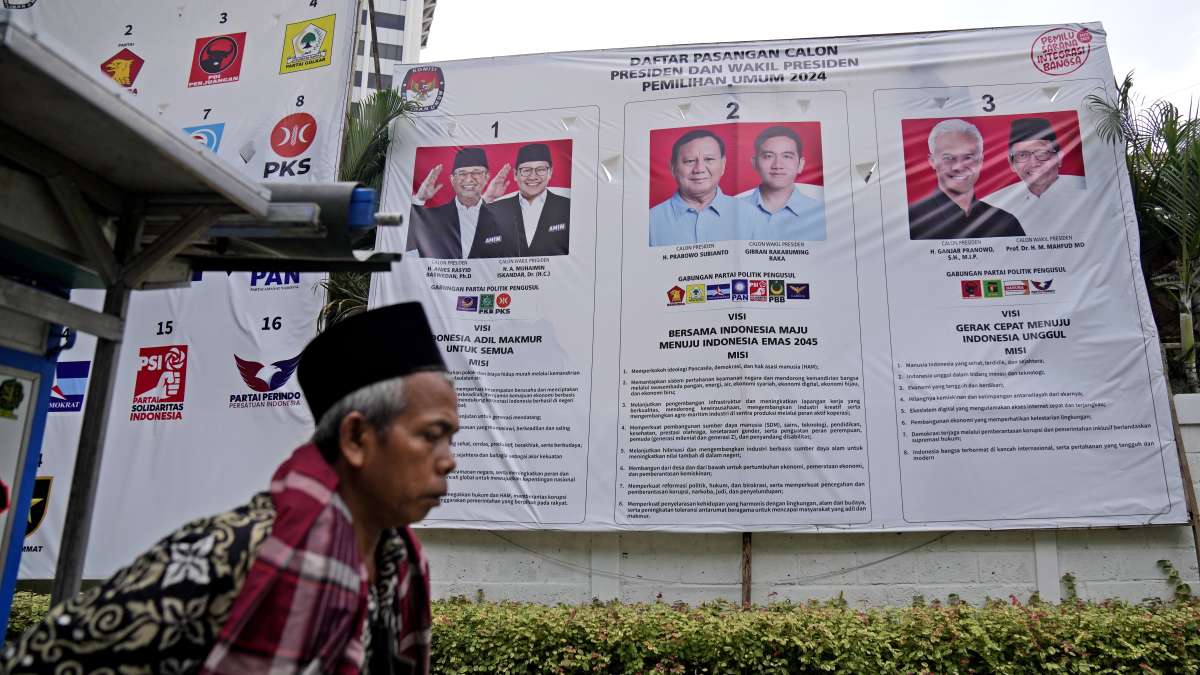Indonesia Presidential election: Here’s what it means for US and China I EXPLAINED
[ad_1]

Bali: When Indonesians cast their votes on Wednesday for a new president in one of the world’s biggest elections, the stakes will also be high for the United States and China. The Southeast Asian nation is a key battleground economically and politically in a region where the rival global powers have long been on a collision course over Taiwan, human rights, US military deployments and Beijing’s aggressive actions in disputed waters, including the South China Sea.
Outgoing President Joko Widodo’s foreign policy avoids criticism of Beijing and Washington but also rejects alignment with either power. The delicate balancing act has won considerable Chinese trade and investment for Indonesia, including a $7.3 billion high-speed railway that was largely funded by China, while Jakarta has also boosted defence ties and intensified military exercises with the US.
Foreign policy may remain unchanged
These policies would likely continue if election frontrunner Prabowo Subianto, the current defence minister whose vice presidential running mate is Widodo’s eldest son, wins, according to analysts. “None of the major structural features of defence and foreign policy, I think, will change,” said Evan Laksmana, a Southeast Asia security expert at the International Institute for Strategic Studies in Singapore.
Subianto adheres to a policy of neutrality and has publicly praised the US and China. He cited America’s historical role in pressuring the Netherlands to recognize Indonesian sovereignty in the 1940s, during a forum in November at the Center for Strategic and International Studies think tank in Jakarta. “This is part of history and we cannot forget this debt of honour,” said Subianto, who also extolled China’s importance to Southeast Asia.
“China is a great civilization. It has contributed a lot and now it is very, very active and contributing a lot to our economy.”
Baswedan says he would shift policy
Former Education Minister and Jakarta Governor Anies Baswedan, a presidential candidate who is trailing Subianto in most independent surveys, said he would shift what he called Widodo’s “transactional” foreign policy to one anchored on principles if he triumphs in the elections. “When a country invades another country, we can say this is against our basic values. Even though we are friends, if rights were violated, we can reprimand them,” Baswedan told The Associated Press in an interview last month without saying which country he was alluding to.
Baswedan said human rights and environmental protection should underpin Indonesia’s foreign policy. “If we have no values, then there is a cost-benefit relationship, where we will only support countries that are profitable for us,” he said.
Why do Indonesia’s elections matter for China and US?
The US and China have both seen how the emergence of a new leader in the region can threaten their interests. Rodrigo Duterte, after capturing the Philippine presidency on an anti-crime platform in 2016, became one of the most vocal critics in Asia of US security policy while nurturing close ties with Chinese leader Xi Jinping and Russian President Vladimir Putin.
Duterte threatened to evict American military personnel who were in the Philippines for combat exercises. He later moved to terminate a defence agreement with Washington that allowed thousands of Americans to enter the country for large-scale combat drills, but he ended that effort as he appealed to the US to provide vaccines at the height of the coronavirus pandemic.
Duterte’s stormy term ended in 2016 and he was succeeded by Ferdinand Marcos Jr., who approved an expansion of the US military presence at Philippine military bases under a 2014 defence pact. Marcos said his decision was aimed at bolstering his country’s territorial defences at a time of increasing aggression by China’s coast guard, navy and suspected militia forces in Philippine-claimed off-shore areas.
China protests
China protested the decision, saying it would provide American forces staging grounds in the northern Philippines across the sea border from the Taiwan Strait that could undermine Chinese national security.
Indonesia and other state members of the Association of Southeast Asian Nations belong to the Non-Aligned Movement, a Cold War-era bloc of mostly developing nations that aspire not to be formally associated with or against any major global power.
Still, the rivalry between Washington and Beijing has permeated the region. Criticisms of China’s increasingly assertive actions in the disputed South China Sea have always been watered down in ASEAN, the 10-member regional bloc.
State members aligned with Beijing, in particular Cambodia and Laos, have opposed any such reproach or attempt to name China as the object of criticism in a joint communique after their annual summits, several regional diplomats have told The Associated Press on condition of anonymity over the years because they lacked authority to speak publicly.
Last year, the Philippine government accused the Chinese Coast Guard and suspected militia forces of using water cannons, a military-grade laser and dangerous manoeuvres against Philippine Coast Guard patrol ships that caused minor collisions in a series of high-seas faceoffs in the disputed waters. Under the chairmanship of Indonesia, ASEAN did not specifically mention China but only made general expressions of concern over aggressive behaviour in the disputed waterway after their summit meetings.
(With inputs from agency)
Also Read: US’s VP Kamala Harris calls China’s new map ‘a violation of international law’
[ad_2]
Source link
